Azolla, a wonderful plant, is a branched free-floating aquatic fern, and it rapidly grows on the water’s surface.
Many farmers, due to limited resources, often struggle to produce sufficient feed for those animals. But Azolla is the right option in front of them.
Azolla is an ideal sustainable feed for cattle, fish, pigs, and poultry. Apart from this, it’s also used as a biofertilizer on the farm. Hence many farmers attract to the Azolla cultivation.
Azolla cultivation is popular in countries like China, Vietnam, the Philippines, etc.
Azolla fixes nitrogen; it is an excellent source of nitrogen and has a high nutrient value.
For Azolla, cultivation required less investment; hence it is a low-cost alternative for a good feed and good biofertilizer.
let,s see what the benefit of Azolla is

Benefits of Azolla
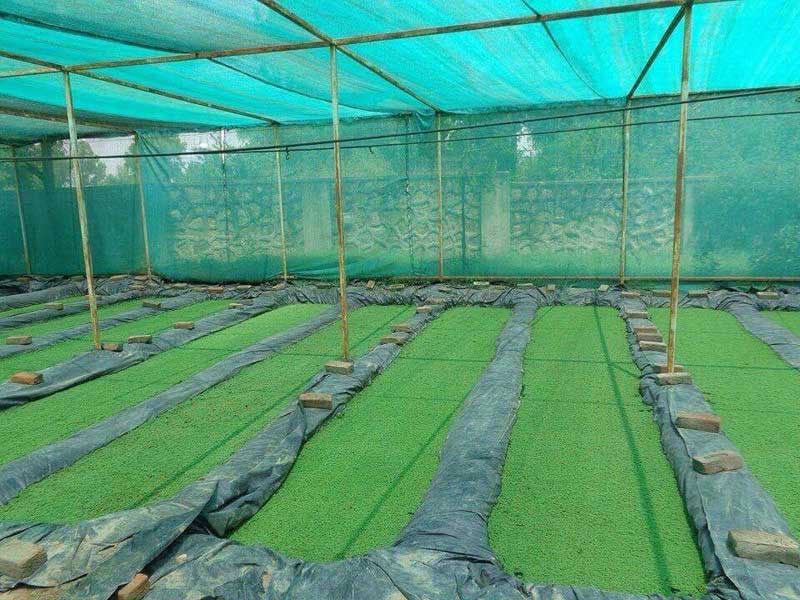
Feed for livestock
Azolla contains very high proteins, amino acids, vitamins (vitamin A, vitamin B12, Beta Carotene), and minerals, so it is an excellent nutrient feed for livestock.
Also, Azolla has low lignin content. So animals easily digest.
It is observed that Feeding Azolla to poultry birds improves the weight of broiler chicken and increases the egg production of layers birds.
In animals, it showed an overall increase of milk yield by 15–20% when 1.5–2 Kg of Azolla was combined with regular feed. This experiment was conducted in the Natural Resources Development Project at Vivekananda Kendra.
You can feed Azolla to sheep, goats, pigs, rabbits, and fish.
Biofertilizer
Azolla fixes atmospheric nitrogen and stores it in leaves. Therefore, it is used as green manure.
It has been observed and appreciated by rice farmers that they cultivate Azolla in paddy farms and increase rice production by 20%.
Weed control
Azolla plant can form a thick layer on water surfaces, so it uses for weed control in paddy farms.
In paddy farms, Azolla forms a thick layer that covers all farm areas and works as organic mulching, which doesn’t allow producing weeds. Also, it slows the water evaporation rate and maintains soil moisture for a long time.
Mosquito control
Azolla has another ability. Azolla restricts the mosquito breeding process, and thus Azolla is also called a “mosquito fern.”

Azolla cultivation procedure
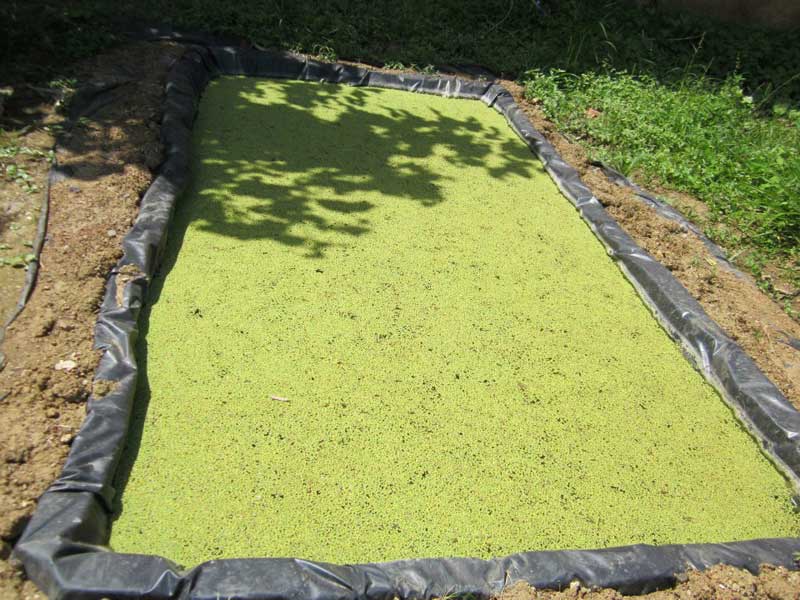
Create an artificial pond for growing Azolla.
For creating the Azolla cultivation pond, select a partially shaded area because Azolla needs 30% sunlight; too much sunlight will destroy the plant. The area under the tree is preferable.
If you decide to grow an Azolla on a large scale, you can make small concrete tanks. Otherwise, you can make the pond any size you want. Now Azolla plastic beds are available in the market they are more convenient and easy to use
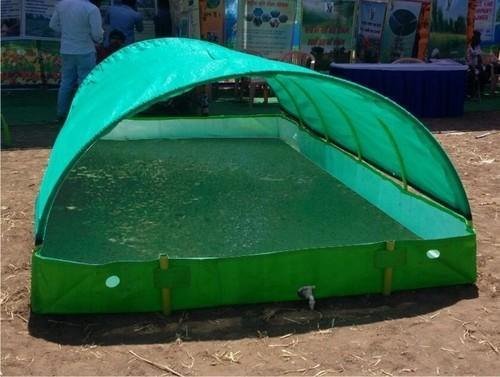
Dig out the soil for the pond and level the soil; after that, spread the plastic sheet around the ground to prevent water loss. Make sure the pond is at least 20 CM Deep.
Add some soil uniformly to the plastic sheet in the pond. For a 2M X 2M size pond, add 10-15 kg soil.
Azolla needs Phosphorus to grow well you can use Super Phosphate along with cow dung slurry. Cow dung increases the available nutrients. Use cow dung 4-5 days old.
Next, fill the pond with water to a level of about 10 cm; this will allow the AzollaPlant’s short route to floating freely, then leave the pond for 2 to 3 days so the ingredients can settle.
After 2-3 days, add Azolla culture in the pond by gently rubbing Azolla in your hands. It helps break Azolla into smaller pieces for faster multiplication.
After a two-week start of harvesting, form a pond of 2M X 2M size, you can harvest 1kg Azolla each day.
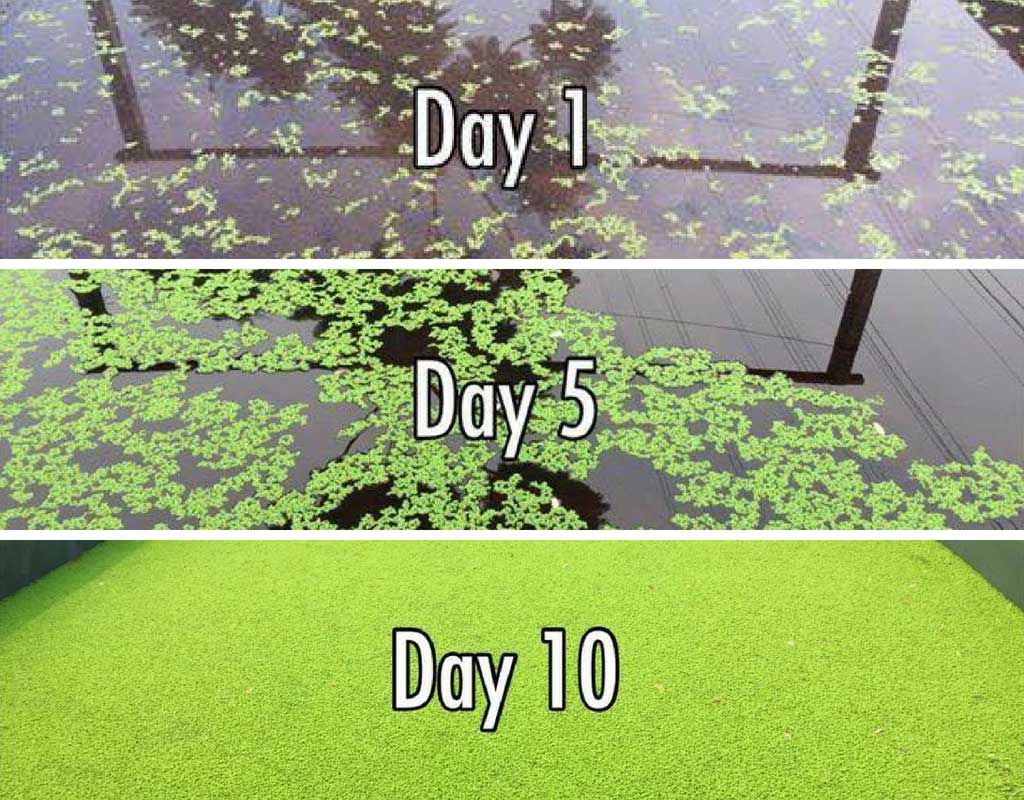
Important tips for growing Azolla
- Azolla rapidly grows, so maintain Azolla biomass 300 gms – 350 gms /sq.meter hence harvest daily to avoid overcrowding.
- Add once in 5 days mixture of Super Phosphate and cow dung also add mixture containing magnesium, iron, copper,
Sulfur etc., at weekly intervals, to enhance the mineral content of Azolla. - Replace 25 to 30% old water with fresh water once in 10 days; it helps prevent nitrogen buildup in the pond.
- Replace complete water and soil at least once in six months, and then add Fresh Azolla seeds.
- Maintain the water level of at least 10 cm, so Azolla root doesn’t grow in the soil by keeping the roots floating, it becomes easy to harvest.
- Harvested Azolla wash thoroughly, so it removes dirt and smell of cow dung and then feeds them to animals.
Where can you Buy the Azolla plant?
You can get an Azolla plant from neighboring farmers, local agriculture officers, or some Agricultural Research organizations like KVK. Also, you can buy Azolla from the online website.
Conclusion
Azolla is an ideal feed for livestock. If you take good care of your Azolla pond, you can harvest good quality weed every day, and it definitely reduces your cost of feed and fertilizer.

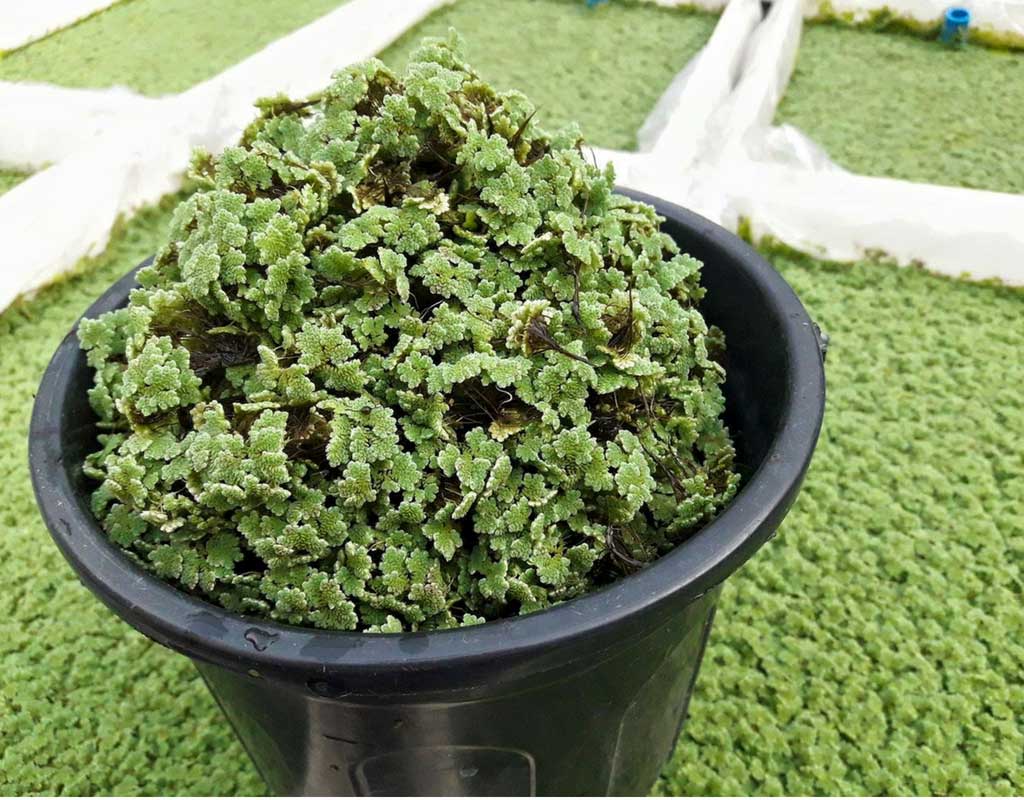


nice
Thanks, Rubel
Thank you
Hi Sir,
Nice to read this post. I need a small clarification. I heard Azolla can be grown much faster in paddy fields..? How far it is true..?Is it viable to grow azolla in paddy fields..?
Hello Vishnu
azolla use as Biofertilizer in paddy fields and there is an increase in rice production by 20%.
Nice. sir is this venture on Azolla profitable. Can we train Self help groups for this
Yes, sugitha.
Hi Sir,
Is it possible to grow both azolla and fish in a single pond. Will it create any harm to fish
yes you can grow both
Thanks a lot for your effort and scientific information
Than you Dr. Tamer
can i farm fish and azolla in an area of 4*8 metres
is it harmful or benifitable for both
Yes you can use, both are benifitable for each other
I want to plant little azolla how can I get the one I will plant
You can buy seed from the E-com portal best buy link available in the article.
This is a very informative article, Azolla is a free-floating water fern and Azolla cultivation helps dairy farmers to reduce the cost of production.
Thank you
Nice and informational
Thank you John
Good stuff
It is a good substitute / low cost feed for Livestock. Birds,hen, fish , etc.
Yes Ashish
Thanks for sharing such an informative piece.
An eye opener for every farmer,small or large, besides affordability.
Thank you for this wonderful information 🙏
is this legal to cultivate in india? Some whete I read this weed
yes it is legal (weed -A weed is a plant considered undesirable in a particular situation, growing where it conflicts with human preferences, needs, or goals)